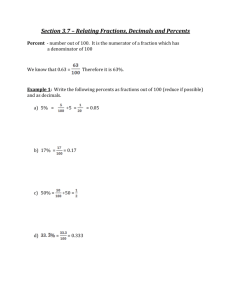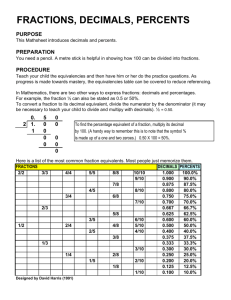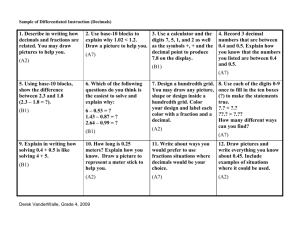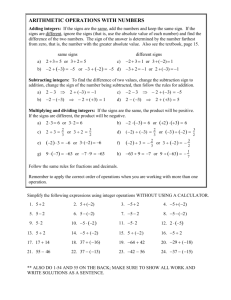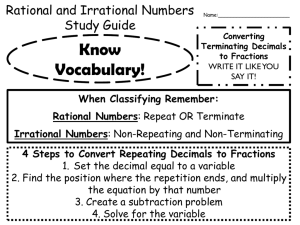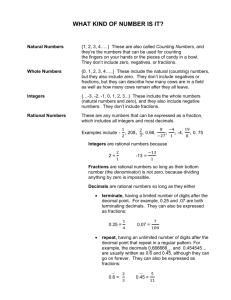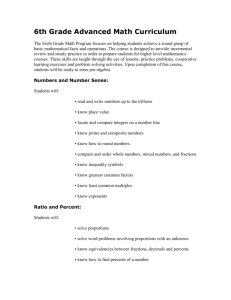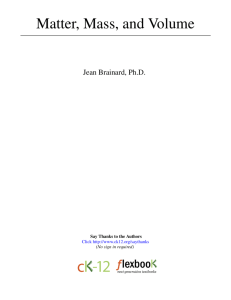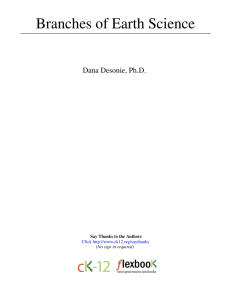Positive and Negative Fraction and Decimal Comparison
advertisement
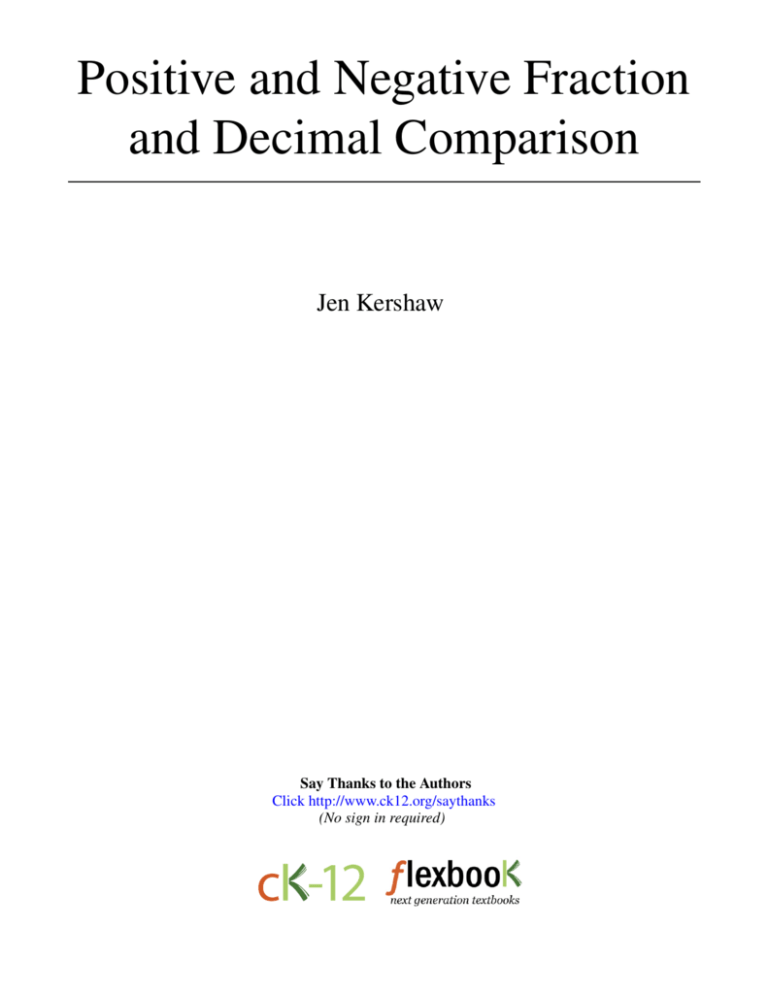
Positive and Negative Fraction and Decimal Comparison Jen Kershaw Say Thanks to the Authors Click http://www.ck12.org/saythanks (No sign in required) To access a customizable version of this book, as well as other interactive content, visit www.ck12.org CK-12 Foundation is a non-profit organization with a mission to reduce the cost of textbook materials for the K-12 market both in the U.S. and worldwide. Using an open-content, web-based collaborative model termed the FlexBook®, CK-12 intends to pioneer the generation and distribution of high-quality educational content that will serve both as core text as well as provide an adaptive environment for learning, powered through the FlexBook Platform®. Copyright © 2013 CK-12 Foundation, www.ck12.org The names “CK-12” and “CK12” and associated logos and the terms “FlexBook®” and “FlexBook Platform®” (collectively “CK-12 Marks”) are trademarks and service marks of CK-12 Foundation and are protected by federal, state, and international laws. Any form of reproduction of this book in any format or medium, in whole or in sections must include the referral attribution link http://www.ck12.org/saythanks (placed in a visible location) in addition to the following terms. Except as otherwise noted, all CK-12 Content (including CK-12 Curriculum Material) is made available to Users in accordance with the Creative Commons Attribution-Non-Commercial 3.0 Unported (CC BY-NC 3.0) License (http://creativecommons.org/ licenses/by-nc/3.0/), as amended and updated by Creative Commons from time to time (the “CC License”), which is incorporated herein by this reference. Complete terms can be found at http://www.ck12.org/terms. Printed: September 5, 2013 AUTHOR Jen Kershaw www.ck12.org C ONCEPT Concept 1. Positive and Negative Fraction and Decimal Comparison 1 Positive and Negative Fraction and Decimal Comparison Here you’ll learn to compare and order positive and negative fractions and decimals. Have you ever been stuck on a problem? Take a look at this dilemma. Instead of letter writing, Carmen had to complete some math homework. She is working on comparing negative fractions and decimals. This is exactly where she got stuck. "I am never going to get this done," she muttered under her breath at the kitchen table. Here is the problem she is stuck on. − 25 _____ −.38 Do you have any idea how to compare these two? Well, you are in luck. This Concept is all about comparing negative fractions and decimals. You will know how to help Carmen by the end of the Concept. Guidance We have been working with the set of integers. Integers are positive and negative whole numbers. However, we can also have positive and negative fractions and decimals. These positive and negative fractions and decimals are not members of the set of integers. They are rational numbers and you will work more with them next year. That being said, we can still order and compare positive and negative decimals and fractions. How do we do this? Let’s take a look. − 12 − 34 If we want to compare negative one-half and negative three-fourths, we have to think of which fraction is closer to zero. Negative one-half is smaller than negative three-fourths. Remember when we work with negative numbers that the smaller negative number is greater. − 21 > − 34 We can use a number line to help us here too. Here is another way to look at these numbers using a number line. You can see here that − 21 is closer to 0 than − 34 so it is the LESS negative and that means it is a greater value. This kind of thinking will work with any negative fractions. Remember that a positive fraction is ALWAYS greater than a negative fraction. What about negative and positive decimals? Negative and positive decimals can be compared just like fractions. Decimals are a part of a whole just like fractions are a part of a whole. Therefore, a positive decimal is ALWAYS greater than a negative decimal. When you have two 1 www.ck12.org negative decimals, the one closer to zero is always greater. The farther a negative decimal is from zero, the smaller its value. .45 ____ -.18 A positive number is always greater than a negative number. This also holds true for decimals and fractions. .45 >-.18 -.29 ____ -.56 The smaller the number the closer it is to zero. -.29 >-.56 Now it’s time for you to practice. Compare the following negative and positive decimals. Example A -.98 ____ -.88 Solution: < Example B − 14 − 12 Solution: > Example C .67 ____ -.67 Solution: > Here is the original problem once again. Instead of letter writing, Carmen had to complete some math homework. She is working on comparing negative fractions and decimals. This is exactly where she got stuck. "I am never going to get this done," she muttered under her breath at the kitchen table. Here is the problem she is stuck on. − 25 _____ −.38 Do you have any idea how to compare these two? First, we have to write them both as fractions. Let’s convert -.38 to a fraction. 38 − 25 _____ − 100 Now we need to write them so they have the same denominator. Let’s change negative two - fifths to a fraction with a denominator of 100. 40 − 25 = − 100 Next we can compare. 40 38 − 100 <− 100 This is the answer. 2 www.ck12.org Concept 1. Positive and Negative Fraction and Decimal Comparison Vocabulary Here are the vocabulary words in this Concept. Integers the set of whole numbers and their opposites Negative Numbers numbers that are less than zero Positive Numbers numbers that are greater than zero Zero is a part of the set of integers, but is neither positive or negative Guided Practice Here is one for you to try on your own. Compare − 25 and − 67 Answer Remember, the closer a value is to zero, the greater the value. Remember this with integers? −4 < −1 This is a true statement. We must keep this in mind when working with negative fractions too. Negative six - sevenths is a larger fraction. Because it is negative, it is farther away from zero. It is the smaller value in this case. − 52 >− 67 This is the answer. Video Review MEDIA Click image to the left for more content. KhanAcademy: Locateintegers ona number line Practice Directions: Compare each pair of values using <, >or =. 3 www.ck12.org 1. -.18 ____ -.27 2. -23 ____ -.98 3. -9 ____ -11 4. -18 ____ -29 5. -67 ____ -89 6. − 14 − 45 7. − 34 − 13 5 8. − 10 − 12 9. − 34 − .75 10. − 14 11. −.25 12. − 18 20 − .25 − 43 − 21 Directions Write the following integers in order from least to greatest. 13. -4, -12, -19, -8, 0, -2, -1 14. 5, 7, 23, 8, -9, -11 15. 4 −1 −1 −5 −3 2 , 4 , 6 , 4
